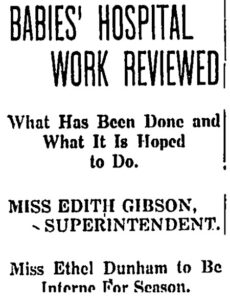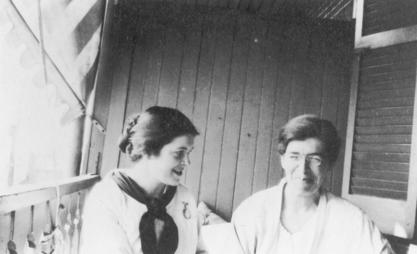By Emily Clark
A student and professor of medicine, Dr. Ethel Collins Dunham devoted her life to ensuring the care of children throughout the early and mid-20th century. As a pioneering neonatologist, she worked in Yale’s first pediatric department and became the chief of child development at the Children’s Bureau in Washington, DC. Dunham built her career at a time when women held few positions of authority in the field of medicine.
Early Life in Connecticut
Dunham was born on March 12, 1883, to the wealthy utility executive Samuel G. Dunham and Alice Collins Dunham. She grew up in a privileged Hartford home, surrounded by her younger siblings and cousins. After graduating from Hartford High School in 1901, Dunham spent two years at boarding student and more time traveling and partaking in other leisure activities common to affluent young women of the time. Dunham developed an interest in medicine and took science classes at her alma mater back in Hartford in 1909. Dunham continued her studies at Bryn Mawr College in Pennsylvania and graduated in 1914.
An Aspiring Physician

The Hartford Courant headline announcing Ethel Dunham as a summer intern at the Babies Hospital in 1916 in Hartford, Connecticut – The Hartford Courant. Used through Public Domain.
At Bryn Mawr, Dunham met Martha May Eliot, another aspiring medical student, who became her good friend and eventually life partner. Both Dunham and Eliot attended the Johns Hopkins School of Medicine in Baltimore, Maryland. Dunham and Eliot were not the first women to earn medical degrees from Johns Hopkins, but women still did not have the same representation as men in the field of medicine. After graduation, Dunham interned at Johns Hopkins Hospital and worked throughout 1918 under the guidance of Dr. John Howland at the Harriet Lane Home.
Moving back to her home state, Dunham briefly worked at New Haven Hospital in 1919. In the post-WWI era, Yale Medical School received support to establish a full-time pediatrics department (New Haven Hospital and Yale Medical School were closely affiliated). A former Johns Hopkins professor, Dr. Edwards A. Park, was appointed to lead it, and he hired two former students, both Dunham and Eliot, as part of the department’s first staff. From there, Dunham continued to climb the ranks and was promoted to assistant and then associate clinical professor at Yale in 1927. While pursuing their careers, Dunham and Eliot lived together most of the rest of their lives.
A Dedication to Newborn Care
As Dunham’s expertise developed, so did her interest in the health of premature and newborn babies. Dunham designed innovative programs at Yale, including purchasing a car for interns to visit new mothers and their babies at home and working to allow pediatricians to examine newborns at the hospital nursery.
In 1935, Dunham left New Haven and took her skills and knowledge to Washington, DC when she assumed the position of chief of child development at the Children’s Bureau. The Children’s Bureau is a national agency established to improve the health and welfare of American children. A year earlier in 1934, the agency also appointed Eliot assistant chief of the Children’s Bureau (she had already worked there for several years, commuting to DC one week a month).
A Legacy of Advocacy Work
With a specialty in premature babies, Dunham investigated the treatment of these infants and established specific standards for the care of newborns. Her studies and publications—such as Standards and Recommendations for the Hospital Care of Newborn Infants, Full Term and Premature (1943)—shaped pediatric policies and practices. In 1948, she also published one of the first books on premature babies entitled Premature Infants: A Manual for Physicians.
Always the scholar, Dunham worked at the World Health Organization in Geneva, Switzerland between 1949 and 1951 studying premature birth. Back in the US at the end of her career, she studied opossum babies to determine if there was a correlation between them and premature human babies. Dunham retired in 1952. Several years later in 1957, American Pediatric Society awarded her their highest honor—the John Howland Medal. She was the first woman to receive the award; ten years later, Eliot became the second. Dunham chose to live out her final years in Cambridge, Massachusetts with Eliot still by her side.
From advocacy work and standards to creating innovations in pediatrics and lecturing on new findings in the field, Dr. Ethel Collins Dunham championed the cause of newborns throughout her life. She died on December 13, 1969, and is buried at Cedar Hill Cemetery in Hartford.
Emily Clark is a freelance writer and an English and Journalism teacher at Amity Regional High School in Woodbridge.









